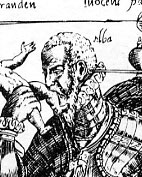

Second Fragment :
Then follows a long and familiar list of grievances to demonstrate that from the very beginning of Philip's reign the king had been trying to bring the Netherlands "into slavery under Spanish rule". It starts with the story of the >>reorganisation of the diocesan structure. The document then recounts that following the request of a number of noblemen (bound together by the so-called >Oath of the Nobles), >>two of their number were sent to Spain to urge Philip II to relax the antiheresy laws. The text goes on to state that instead of listening to the envoys, the king declared those who submitted this request were guilty of treason and as such liable to be executed. Next, the document relates the Spanish reaction to the events of the 'Annus mirabilis', 1566 (which witnessed the >Iconoclastic Fury) and starts the story of Alva's dreadful tyranny.
Thus the king sent the >duke of Alva and a large army to these provinces to suppress their liberties. The duke was notorious for his severity and cruelty, he was one of the principal enemies of these countries and was accompanied by advisers of the same nature and mentality.
| Detail of Alba | The duke of Alva entered these countries without meeting any resistance and was received by their poor inhabitants >with great respect and honour. They expected only mercy and clemency, for in his letters the king had often hypocritically promised them this. [...] [T]he duke of Alva who was a foreigner and not related to the king, declared immediately upon his arrival that the king had appointed him commander-in-chief, and shortly afterwards even governor-general of the country. This was contrary to the privileges and ancient traditions. And making his intentions quite clear he immediately put troops into the principal towns and fortresses and built castles and fortifications in the most important and powerful towns to keep them subdued. On behalf of the king and in kindly terms he bade the highest nobles come to him under the pretext of needing their advice and of wishing to employ them in the service of the country. But those who complied with his invitation were imprisoned and contrary to the privileges removed from Brabant where they had been seized. >He had them tried before him although he was not competent to be their judge, and then, without completing their trial, sentenced them to death and >had them publicly and ignominously executed [this link will take you to the pictorial material page - please follow the instructions at the top]. Others, more aware of the hypocrisy of the Spaniards, left the country but were for this condemned by Alva to forfeit their life and possessions. Thus the poor inhabitants, having lost their fortresses and the princes who could defend their freedom, would be helpless in the face of Spanish violence.
